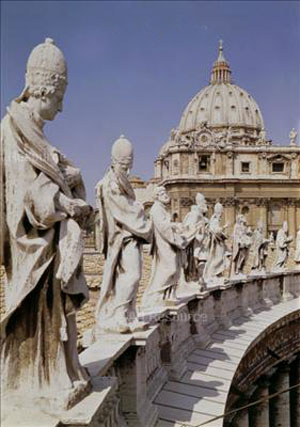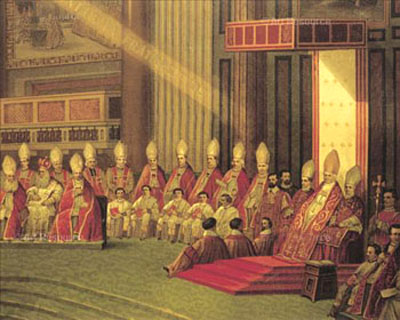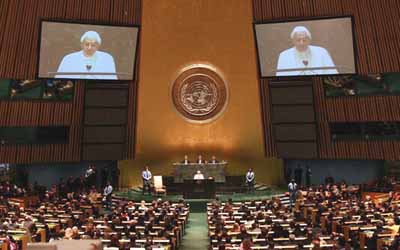 |
About the Church
The Infallibility of the Church – II
What Is Papal Infallibility?
When Is It Exercised?
Fr. Leonel Franca, S.J.
The Church, as we have seen, is infallible. Along with assigning her the mission of preserving the patrimony of the truth that must be transmitted pure through all the generations, God made her a vigilant and incorruptible sentinel. One empire succeeds another in the turbulences of History; theories are born, bloom and fade; philosophical systems clash and struggle in their contradictions. Above the wreckage of all these human institutions, the truth victoriously and infallibly stands, maintained and preserved by the Immaculate Bride of Christ.

The Popes are infallible only in rare circumstances |
But wherein lays this infallibility? What is its authentic organ? Reason illuminated by faith answers: Passively, it dwells in the whole Church which receives the truths given to her and believes them. Actively, it dwells in her chief, the Supreme Shepherd, the Roman Pontiff, to whom Christ confided the mission of confirming his brothers in the faith. For, just as life exists in the whole human body, it is the soul that infuses that life and conserves it.
The Pope is, therefore, infallible. This is one of the dogmas that has been most falsified and misrepresented by malicious and narrow-minded unbelievers, liberals and Protestants. As soon as Vatican Council I defined Pontifical Infallibility in 1870, massive intrigues were instigated, mockery and slander were spread to misrepresent this dogma.
Against such adversaries, the first thing to do is to explain the true character of infallibility. Then, if these enemies still have any remnant of sincere love for the truth, they will recognize the vacuity of the many objections to Papal Infallibility, no matter how invincible they appear at first sight.
Hence, let us read the definition of Vatican Council I in the official document wherein the Church teaches her doctrine:
“We teach and define as a divinely revealed dogma that: when the Roman Pontiff speaks ex cathedra, that is, when, in the exercise of his office as Shepherd and Teacher of all Christians and, in virtue of his supreme apostolic authority, he defines a doctrine concerning faith or morals to be held by the universal Church, he possesses, by the divine assistance promised to him in St. Peter, that infallibility which the Divine Redeemer willed His Church to enjoy in defining doctrine concerning faith or morals.
“Therefore, such definitions of the Roman Pontiff are of themselves, and not by the consent of the Church, unchangeable.
“So then, should anyone, which God forbid, have the temerity to reject this definition of ours: Let him be anathema.” (1)
Each word of this document has high significance. Everything is well weighed and measured. From this declaration we infer the true notion of infallibility: It is a supernatural privilege, founded on the divine assistance promised by Jesus Christ to the Pope, that he would not err any time that he – speaking ex cathedra as supreme Teacher of the universal Church – defines that a doctrine of faith or morals belongs to the deposit of Revelation.

At Vatican Council I, above, Pius IX defined papal infallibility as a dogma |
It is a privilege that is not given to the Pope as an individual, but to his office, to his function. The Pope is infallible not for his own advantage, but for the benefit of the Church. In the sphere of private actions, the Pontiff is subject to errors of the intellect and moral sins.
As a man, the Pope can be as erudite as Benedict XIV, as good a moralist as Gregory the Great, as eloquent as Pius IX, but the theologian, the writer and the preacher are fallible - with or without the tiara on his head. John XXII condemned as Pope what he himself as a private theologian had preached about the beatific vision. In his will, Gregory XI reproved as erroneous or contrary to orthodoxy anything he might have affirmed when he was a theologian. For the Pope to be infallible, he needs to act as Pope in the effective exercise of his function as supreme leader of Christianity.
But this still is not enough. The Papacy has many functions. The Pope is also an administrator, a temporal King, a politician and a diplomat. To none of these functions is the privilege of infallibility linked. He may make administrative errors and his political views may not be the most profound or opportune. Catholics should respect these decisions as the Pope's dignity requires, but these pontifical decisions do not oblige from them an act of faith. (2)
What is infallible in the Pope is the Teacher, and, even here, only the supreme Teacher who instructs the universal Church. A papal brief addressed to an individual or a letter in which he praises the work of an author is not of this nature. The Successor of Peter, speaking from the apostolic chair [ex cathedra], must expressly and peremptorily declare that this or that truth belongs to Revelation. Then, and only then, is he infallible.
Further, in the dogmatic bulls or official documents in which the Pope defines a doctrine, infallibility does not cover every proposition in the document. The introductory comments and the preparatory and concluding considerations that frame the definition are not covered by infallibility. Only the definition is infallible, that is, the solemn, absolute and unchangeable declaration that a doctrine regarding faith and customs belongs to the divine deposit of Revelation.
A truth defined in this way demands from the faithful an act of faith. To reject it or to doubt it is ipso facto to leave the communion of the Church; it is to fall into heresy (which is the meaning of anathema sit). This is what the First Vatican Council meant when it used the word define.

Benedict XVI lending his support to the UN was not infallible |
As we see, a dogmatic definition is a public, rare and solemn act that interests the whole Church and, therefore, it must be clearly, explicitly and unmistakably known by the whole Church. Its formula must be written with the utmost clarity, which leaves not the least shadow of doubt in any mind. To imagine papal infallibility as an indeterminate, confused privilege that the Pope can use as he pleases without the Church’s full and clear knowledge is to be completely ignorant of what it is.
After having accurately set out the subject of infallibility, the conciliar definition specifies its object with equal acuity. The privilege of inerrancy only applies to questions concerning faith and morals – in doctrina fide et moribus definienda.
Christ delimited the domain of His Magisterium to this: to enlighten minds as they strive for their supernatural aims and to guide consciences in the exercise of their moral actions. The orbit of the Church’s teachings is revelation in the speculative and practical spheres, supernatural truth and sanctity.
In summary, the exercise of infallibility is essentially conditioned by these two clauses: 1. The Pope must define ex cathedra – as explained; 2. The object of the definition must be a doctrine related to faith or morals.
1. First Vatican Council, session IV, chapter 4.
2. In their collective Pastoral Instruction of 1871, duly approved by Pius IX, the Swiss Bishops taught: “The Pope is infallible neither as a man nor as a scholar, nor as priest or a bishop, nor as a temporal Prince, a judge or a legislator. He is not infallible or impeccable in his life or behavior, his political views, or his dealings with the Princes, and not even in the government of the Church. The Pope is infallible solely and exclusively when, as supreme Teacher of the Church, he pronounces on matter of faith or morals a definition that must be accepted and held as obligatory by all the faithful.” L Franca, A Igreja, a reforma e a civilização, p. 162, note 1).

Summarized and translated by the TIA desk from Leonel Franca,
A Igreja, a Reforma e a Civilização, Rio: Livraria Catholica, 1928, pp. 159-164.
Posted October 11, 2010

Related Topics of Interest
 Infallibility: First Requirement to Accomplish Christ’s Mandate Infallibility: First Requirement to Accomplish Christ’s Mandate
 Thy Will Be Done, on Earth as It Is In Heaven Thy Will Be Done, on Earth as It Is In Heaven
 St. Paul's Teaching on Facing False Teachers of Doctrine St. Paul's Teaching on Facing False Teachers of Doctrine
 Marvelous Continuity and Shocking Change Marvelous Continuity and Shocking Change
 Newman against Papal Infallibility Newman against Papal Infallibility
 How Should a Catholic Act before Bad Popes? How Should a Catholic Act before Bad Popes?

Related Works of Interest
|
About the Church | Home | Books | CDs | Search | Contact Us | Donate

© 2002-
Tradition in Action, Inc. All Rights Reserved
|
 |
|